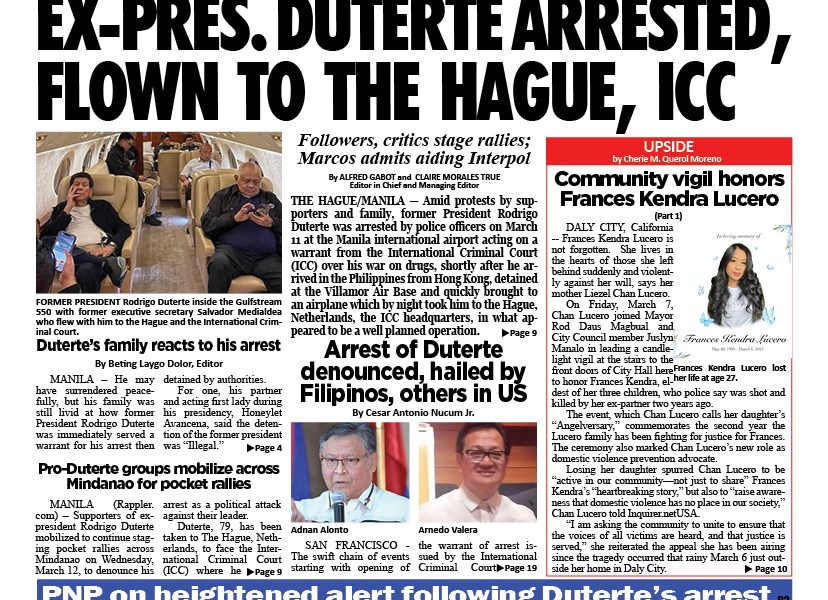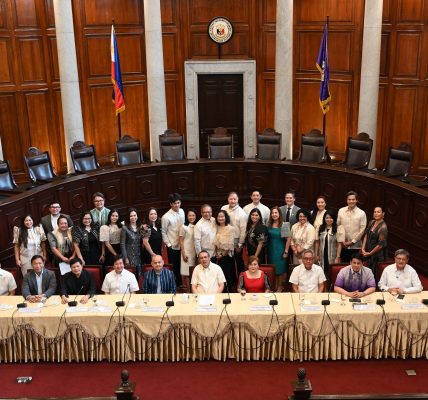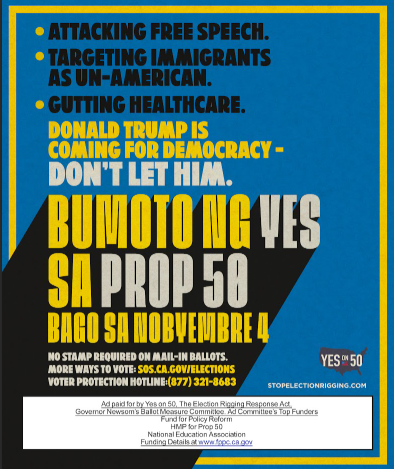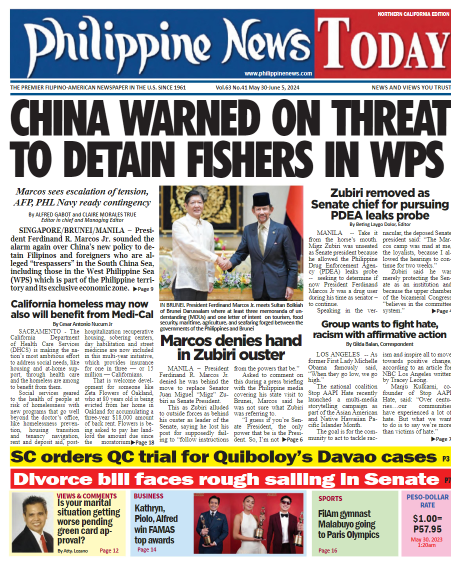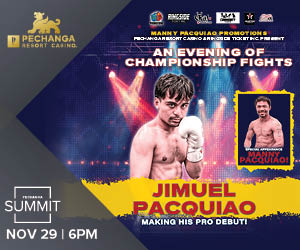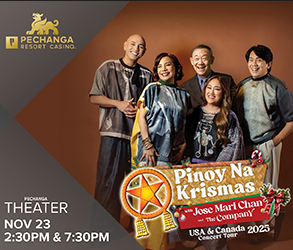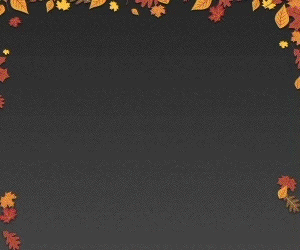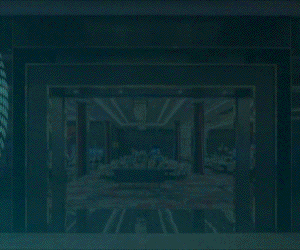EX-PRES. DUTERTE ARRESTED, FLOWN TO THE HAGUE, ICC; Followers, critics stage rallies, Marcos admits aiding Interpol
By ALFRED GABOT, Editor in Chief, and CLAIRE MORALES TRUE, Managing Editor
THE HAGUE/MANILA (March 12, 2025) — Amid protests by supporters and family, former President Rodrigo Duterte was arrested by police officers on March 11 at the Manila international airport acting on a warrant from the International Criminal Court (ICC) over his war on drugs, shortly after he arrived in the Philippines from Hong Kong, detained at the Villamor Air Base and quickly brought to an airplane which by night took him to the Hague, Netherlands, the ICC headquarters, in what appeared to be a well planned operation.
______________________
ICC first appearance
THE HAGUE – Former Philippine President Rodrigo Roa Duterte is scheduled to make his initial appearance before the International Criminal Court on March 14, 2025, at 2:00 PM (local time / 9:00 PM Manila time) before Pre-Trial Chamber I.
_____________________
Duterte’s arrest blamed on President Ferdinand Marcos Jr. immediately set off protests for and against the arrest in the Philippines and the United States, prompting the Philippine National Police (PNP) and the Armed Forces of the Philippines (AFP) to be on heightened alert. (See rerlated stories)
Duterte had attended a thanksgiving and campaign rally of supporters in Hong Kong for his senatorial candidates when he returned to Manila with common-law wife Honeylet Avancena, daughter Kitty, and former officials led by ex-executive secretary Salvador Medialdea and was met by several police officers led by Gen. Nicolas Torre as more police officers waited outside the airport. Duterte and party initially questioned his arrest as he was not apprised of his crime and presented a copy of the ICC warrant for his arrest.
At the Villamor Air Base, Duterte, 79, was finally presented the ICC warrant which cited that he faces a charge of “the crime against humanity of murder” in connection with his drugs crackdown in which thousands were reportedly killed by officers and vigilantes, which critics said were often without proof they were linked to drugs.
The drug war claimed at least 6,000, according to official government data. However, human rights watchdogs and the ICC estimated the death toll from the drug war to be between 12,000 and 30,000 from 2016 to 2019. They also said several of the cases are extrajudicial killings.
The ICC’s warrant for his arrest states that as president, Duterte created, funded and armed “death squads” in his war on drugs that carried out murders of purported drug users and dealers.
Duterte is still presumed innocent under Philippine and international laws until the charges against are proven.
After over 20 hours, Duterte’s plane reached Netherlands following a refuelling and layover in Dubai, United Arab Emirates. In a video from the plane, Duterte appeared to be in high spirit despite looking emaciated as he allayed the fears of his family and supporters.
From the airport, Duterte was brought to the Hague Penitentiary Institution or the Scheveningen Prison where he is set to be held while awaiting trial by the ICC.
Scores of supporters of Duterte were seen outside the prison and infront of the ICC when Duterte arrived while a handful of anti-Duterte group members also waited as they called for the imprisonment of the former president.
Duterte was brought to The Hague Penitentiary Institution or the Scheveningen Prison at 7:34 p.m. (2:34 a.m. Philippine time) aboard a black vehicle.
Supporters who have gathered outside the prison chanted “We love Duterte” and “Bring him back” as the convoy entered the facility.
Lawyers and supporters of Duterte attempted to halt the departure of the former president by filing petitions for TRO and injunctions before the Supreme Court, but the high court did not issue a TRO. However, the SC continues to study the petitions and new petitions filed also by family members.
Some lawyers said the High Court may no longer had jurisdiction as the case is already with the ICC.
The case of Duterte may take two to eight years, according to some legal experts.
Duterte joined Russian Viktor Putin and Israeli Prime Minister Benjamin Netanyahu and other leaders in a long list of people facing ICC warrants of arrest.
Vice President Sara Duterte immediately set off for the Hague to assist her father which her brother, Rep. Paolo Duterte, also secured authority from the House of Representatives to follow to the Netherlands.
President Marcos admitted he approved the service of the ICC warrant to Duterte in what he said as keeping cognizance to the country’s obligation under international agreements.
Marcos had earlier said he will not honor the ICC warrant since the Philippines had withdrawn from the ICC.
Sen. Ronald dela Rosa, who was Duterte’s police chief during the drug war and is widely expected to be next to be arrested, said Marcos had assured him in a meeting in Malacanang that he (Marcos) will not enforce the ICC arrest warrant if ever one is issued.
Dela Rosa, who insisted Duterte and the PNP only did what was needed at the time to save the youth from the scourge of illegal drugs menace, said he was willing to be arrested so he could give Duterte company in the ICC prison.
“Mr Rodrigo Roa Duterte… was surrendered to the custody of the International Criminal Court,” the ICC said in a statement.
“He was arrested by the authorities of the Republic of the Philippines in accordance with an arrest warrant issued… for charges of murder as a crime against humanity,” it added.
Duterte will be brought before a judge in The Hague in the coming days for an initial appearance to determine if his arrest was in order. He was transferred to a detention unit on the Dutch coast.
Denying claims that Duterte was kidnapped, Malacanang said the government’s decision to “surrender” former President Rodrigo Duterte to international authorities to face trial at the ICC is legal under Republic Act 9851.
“He was not extradited in the first place, he was surrendered… It is regular, what the government did, it was based on the law, RA 9851,” Castro said in a briefing, referring to the Philippine Act on Crimes Against International Humanitarian Law, Genocide, and Other Crimes Against Humanity.

